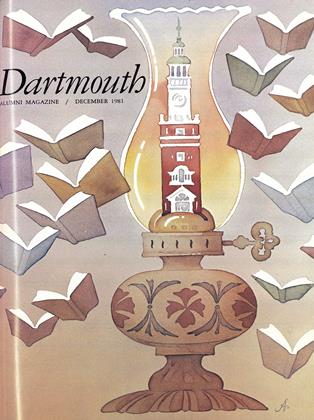THE ROAD FROM HERE:Liberalism and Realities in the 1980sby Paul Tsongas '62Knopf, 1981. 280 pp. $12.95
These are le.an days for liberals. Ronald Reagan is in the White House, Kemp-Roth is in the tax law. The pleas of Edward Kennedy, Democrat of Massachusttts, are seldom heard on the floor of the Senate and almost never on television. And early this autumn, an adviser to Walter Mondale said the former vice president and potential 1984 presidential candidate will not try to identify himself with the liberalism of the 19605.
Amid all this Sturm und Drang comes Paul Tsongas, the other Senator from Massachusetts. Last year, with Kennedy still in the race for the Democratic nomination Tsongas delivered a stunning speech that is now widely regarded as the valedictory of traditional liberalism. "The fact is that liberalism is at a crossroads," Tsongas told the national convention of Americans for Democratic Action, the quintessential liberal group. "It will either evolve to meet the issues of the 1980s, or it will be reduced to an interesting topic for Ph. D.-writing historians."
For months Tsongas wondered if liberalism had a future, and he struggled to find alternatives to the Reagan program of budget, program, and tax cuts. The product of all that brooding is The Road FromHere. It is, as Robert Frost might have put it if he had been interested in such things, the road not taken. Not yet, at least.
That path, Tsongas writes, is "compas- sionate realism" a way of looking at the world and its problems that combines the compassion of traditional liberalism with the realism that, in recent years at least, has been identified with conservatism. It is a different way of assembling the jigsaw puzzle of politics.
It makes for an unconventional mix. Tsongas supports gay rights and nuclear power. He believes the Soviets are the greatest threat to national security and cautions against a drive for nuclear superiority. He criticizes "special-interest regulation"-and calls for more cooperation between labor and management.
What, then, does Paul Tsongas advocate? "What we need," he argues, "is less rhetoric and more common sense. Fewer pendulum swings and more steady courses. Less antipathy between the public and private sectors and more cooperation. In a word, realism."'
Tsongas focuses on eight key national and international issues: energy, Soviet aggressiveness, productivity, resource allocation, the Third World, international trade, the environment, add inflation. To those issues he applies his compassionate realism, and he does it soberly and clearly, and with the reminder that realism and compassion are not incompatible.
It is, in short, a brand of the old liberal medicine spruced up to meet the problems of the 1980s, when the principal source of imported oil can be thrown into new spasms of instability, by the assassination of one key leader, when the siren song of deregulation seems to rule the councils of government, when the national debt reaches a trillion dollars and, not to forget, when more than a quarter of a million people spend a Saturday afternoon marching in a potpourri of protest known as Solidarity Day.
"If liberal Democrats once again are chosen to exercise power, we should resolve to be relevant to the great issues," Tsongas writes. "We should honor our past but not be mesmerized by it. In a time when the shortcut and the short term seem to be the guiding priorities in business and government, we should remember that our task is to mold the future." That is the guiding philosophy of The Road from Here, and it is good advice for us all.
David M. Shribman '76
David Shribman is a writer in theWashington Bureau of the New York Times.
 View Full Issue
View Full Issue
More From This Issue
-
 Feature
FeatureHard times in the pressure-cooker
December 1981 By Mary Ellen Donovan -
 Feature
FeatureAmerica's First Hostage Negotiator
December 1981 By Peter Bridges -
 Feature
FeatureFirst Five Months
December 1981 By Shelby Grantham -
 Feature
FeatureEven Shoes Are Back
December 1981 By Nancy Wasserman '77 -
 Article
ArticleA Skeptic in Simian Clothing
December 1981 By Rob Eshman '82 -
 Sports
SportsAn Unexpected Pleasure
December 1981 By Brad Hills '65
Robert H. Ross '38
-
 Books
BooksTHE FOUR SEASONS OF SUCCESS.
FEBRUARY 1973 By ROBERT H. ROSS '38 -
 Books
BooksFacing the Great Issues
MARCH 1978 By ROBERT H. ROSS '38 -
 Article
ArticleSteel and Crinoline
May 1979 By ROBERT H. ROSS '38 -
 Books
BooksFundaments
June 1979 By ROBERT H. ROSS '38 -
 Books
BooksMyth and Counter-Myth
NOVEMBER 1981 By Robert H. Ross '38 -
 Books
BooksUp From the Nickelodeon
NOVEMBER 1981 By Robert H. Ross '38
Books
-
 Books
BooksMemories and Anecdotes
January 1916 -
 Books
BooksTHE LAND OF THE POLISH PEOPLE
December 1943 -
 Books
BooksShelflife
July/August 2005 -
 Books
BooksGERMIN ACIÓN DEL ALBA.
June 1962 By ELIAS L. RIVERS -
 Books
BooksON COPIA OF WORDS AND IDEAS.
JUNE 1964 By JOHN W. ZARKER -
 Books
BooksLIQUIDITY AND STABILITY
January 1941 By Ray V. Leffler



